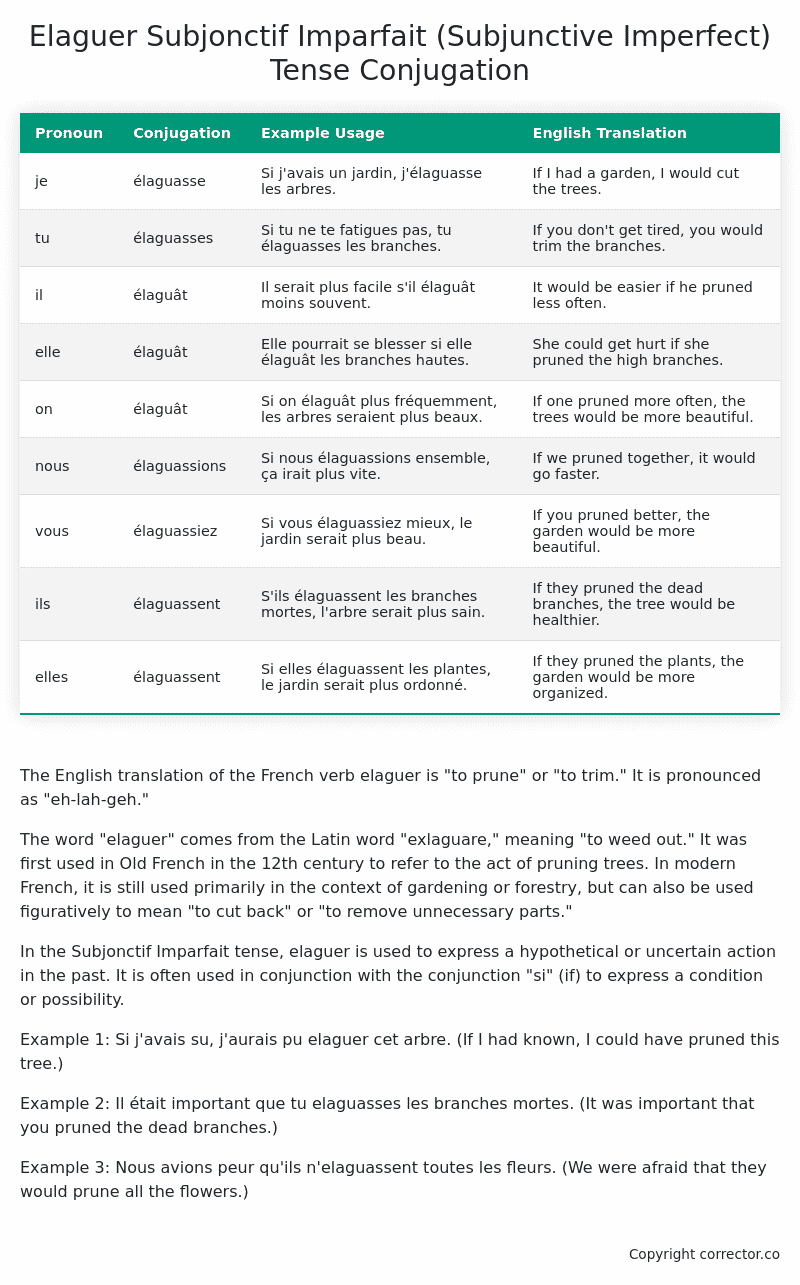Subjonctif Imparfait (Subjunctive Imperfect) Tense Conjugation of the French Verb elaguer
Introduction to the verb elaguer
The English translation of the French verb elaguer is “to prune” or “to trim.” It is pronounced as “eh-lah-geh.”
The word “elaguer” comes from the Latin word “exlaguare,” meaning “to weed out.” It was first used in Old French in the 12th century to refer to the act of pruning trees. In modern French, it is still used primarily in the context of gardening or forestry, but can also be used figuratively to mean “to cut back” or “to remove unnecessary parts.”
In the Subjonctif Imparfait tense, elaguer is used to express a hypothetical or uncertain action in the past. It is often used in conjunction with the conjunction “si” (if) to express a condition or possibility.
Example 1: Si j’avais su, j’aurais pu elaguer cet arbre. (If I had known, I could have pruned this tree.)
Example 2: Il était important que tu elaguasses les branches mortes. (It was important that you pruned the dead branches.)
Example 3: Nous avions peur qu’ils n’elaguassent toutes les fleurs. (We were afraid that they would prune all the flowers.)
Table of the Subjonctif Imparfait (Subjunctive Imperfect) Tense Conjugation of elaguer
| Pronoun | Conjugation | Example Usage | English Translation |
|---|---|---|---|
| je | élaguasse | Si j’avais un jardin, j’élaguasse les arbres. | If I had a garden, I would cut the trees. |
| tu | élaguasses | Si tu ne te fatigues pas, tu élaguasses les branches. | If you don’t get tired, you would trim the branches. |
| il | élaguât | Il serait plus facile s’il élaguât moins souvent. | It would be easier if he pruned less often. |
| elle | élaguât | Elle pourrait se blesser si elle élaguât les branches hautes. | She could get hurt if she pruned the high branches. |
| on | élaguât | Si on élaguât plus fréquemment, les arbres seraient plus beaux. | If one pruned more often, the trees would be more beautiful. |
| nous | élaguassions | Si nous élaguassions ensemble, ça irait plus vite. | If we pruned together, it would go faster. |
| vous | élaguassiez | Si vous élaguassiez mieux, le jardin serait plus beau. | If you pruned better, the garden would be more beautiful. |
| ils | élaguassent | S’ils élaguassent les branches mortes, l’arbre serait plus sain. | If they pruned the dead branches, the tree would be healthier. |
| elles | élaguassent | Si elles élaguassent les plantes, le jardin serait plus ordonné. | If they pruned the plants, the garden would be more organized. |
Other Conjugations for Elaguer.
Le Present (Present Tense) Conjugation of the French Verb elaguer
Imparfait (Imperfect) Tense Conjugation of the French Verb elaguer
Passé Simple (Simple Past) Tense Conjugation of the French Verb elaguer
Passé Composé (Present Perfect) Tense Conjugation of the French Verb elaguer
Futur Simple (Simple Future) Tense Conjugation of the French Verb elaguer
Futur Proche (Near Future) Tense Conjugation of the French Verb elaguer
Plus-que-parfait (Pluperfect) Tense Conjugation of the French Verb elaguer
Passé Antérieur (Past Anterior) Tense Conjugation of the French Verb elaguer
Futur Antérieur (Future Anterior) Tense Conjugation of the French Verb elaguer
Subjonctif Présent (Subjunctive Present) Tense Conjugation of the French Verb elaguer
Subjonctif Passé (Subjunctive Past) Tense Conjugation of the French Verb elaguer
Subjonctif Imparfait (Subjunctive Imperfect) Tense Conjugation of the French Verb elaguer (this article)
Subjonctif Plus-que-parfait (Subjunctive Pluperfect) Tense Conjugation of the French Verb elaguer
Conditionnel Présent (Conditional Present) Tense Conjugation of the French Verb elaguer
Conditionnel Passé (Conditional Past) Tense Conjugation of the French Verb elaguer
L’impératif Présent (Imperative Present) Tense Conjugation of the French Verb elaguer
L’infinitif Présent (Infinitive Present) Tense Conjugation of the French Verb elaguer
Struggling with French verbs or the language in general? Why not use our free French Grammar Checker – no registration required!
Get a FREE Download Study Sheet of this Conjugation 🔥
Simply right click the image below, click “save image” and get your free reference for the elaguer Subjonctif Imparfait tense conjugation!

Elaguer – About the French Subjonctif Imparfait (Subjunctive Imperfect) Tense
Formation
Common Everyday Usage Patterns
Interactions with Other Tenses
Subjonctif Présent
Indicatif Passé Composé
Conditional
Conditional Perfect
Summary
I hope you enjoyed this article on the verb elaguer. Still in a learning mood? Check out another TOTALLY random French verb conjugation!


